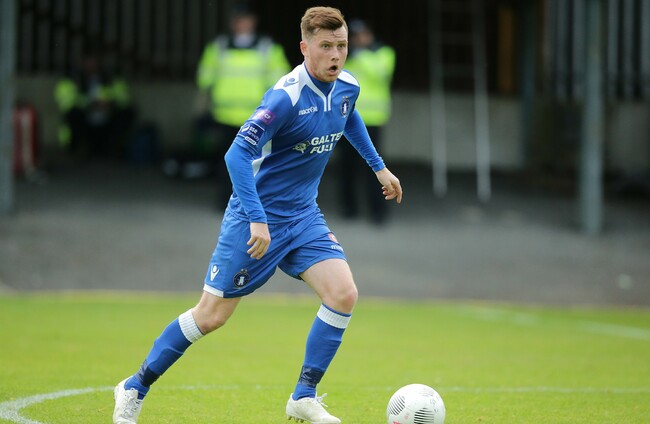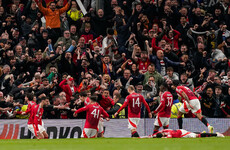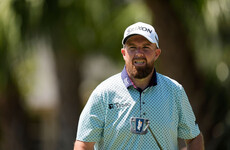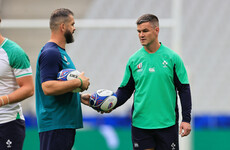AT THE MOMENT, Sean Russell has good and bad days.
When The42 last spoke to him in September, he was fighting for his career.
On 29 March 2019, he suffered a cruciate ligament injury while playing for Limerick in the First Division against Athlone. It was to prove to start of a long battle that would test him both mentally and physically.
The orthopaedic surgeon he saw told Russell the injury was “as bad as they come”.
His club Limerick were financially stricken at the time and said they couldn’t pay the money required for the surgery.
“The first [surgery] I did get done was massive for my well-being and the second one could stop me from playing again,” Russell explained at the time.
“So [the issues were] hindering my own health. The club were aware of it and in my opinion, it didn’t seem like they cared too much.”
After Russell went public with the story, there was blowback from Limerick, and he was told in front of a dressing room full of players that “they didn’t have to do anything for me”.
With the club not acting, Russell hoped the Professional Footballers’ Association of Ireland might intervene, but they could only provide limited assistance due to his status as an amateur footballer. He also consulted the Football Association of Ireland, but they told him it was “between me and the club”. The details remain unclear, but Russell believes there had been no insurance put in place by the club to protect their players in such circumstances, which complicated matters further.
In the end, his primary means of support was a GoFundMe campaign set up by a friend that aimed to raise €10,000 for his surgery.
Ultimately, Russell was forced to retire just days after turning 26. On 19 December, he confirmed the news on Twitter, writing that “my health physically and mentally needs to take priority”.
When we meet, it’s only a couple of weeks after the announcement, with the Dubliner slowly coming to terms with the fact that he will no longer be able to play the game he devoted much of his life to. The ACL operation had gone well, he thought.
I went back into my review for that and the surgeon was very happy,” he recalls. “He was saying it was healing quite well for the stage I’m at, but the first operation was always going to be the difficult one. Given the nature of it, it was a bad one. The tendons have loosened slightly and it’s definitely no football for the future.
“Any sort of impact could do it again. The big problem now is with the amount of work I’ve already had done to the knee, if it was to happen again, I’d be left in a really difficult situation and [suffer] long-term effects — you’re talking about another surgery, which is difficult to do.
“It’s a no-brainer to not play again, as hard as it is. I don’t really have an option, it’s not a choice.”
The nature of the injury caused further problems for Russell off the field. He had been on probation for a full-time job in Limerick for six months, but ultimately had to leave. The setback left him physically unable to work.
Living with his girlfriend down in Limerick, the financial stress that ensued proved overwhelming. Mentally, he began to struggle and the Lucan native moved back home to be around his family.
The biggest challenge now is filling the void left without football. In addition to being an important source of income, for Russell, the game was essentially his life. For nearly a year, he has been unable to even go for a jog due to his injury. For someone used to such an active lifestyle that involved constant training and matches, adapting to essentially the opposite of that has been immensely difficult.
“I’m still trying to deal with it now, it’s early days for me,” he says. “I can’t remember not playing football and that’s not just at a professional level, especially when you play in Ireland, you dedicate your whole life to it.
For me, football can relieve stress. If I was having a bad day, I could go out and kick the ball with my brothers. So it’s not just playing in the matches and the training, I got most of my enjoyment from football.”
Part of Russell can’t help but wonder what if he hadn’t been forced to wait so long for the second operation and Limerick were able to provide him with adequate financial support.
“I’m at a stage now where even if I wasn’t playing, I could be back out jogging and doing things that I’d do on a weekly basis.
“Coming up to a year, I haven’t been able to go above walking pace, which is hard. It’s probably down to the fact that I got my second surgery six months later instead of six weeks.
“The realistic target is ‘let’s get you running without having to get another op’. [The surgeon] was saying: ‘If we can get you running, we’re doing well.’”
***
For all the difficulties Russell endured since that fateful day at Markets Field, the former player has at least gained a greater sense of perspective on the game. He marvels at the commitment of League of Ireland footballers, many of whom are competing primarily for the love of the sport at the expense of more stable and financially rewarding opportunities elsewhere.
“You dedicate your whole life to this, your hours and your spare time. You make sacrifices with friends, families and parties growing up, and you’ve got matches on the weekends. Then, all of a sudden, it comes to an end, and that’s it. ‘Go find your own way.’ I know there are players that don’t go to college, because they opt to go for professional contracts. Whether that’s the best decision or not is up to them, it’s their decision to make. But if someone does go with that decision, there needs to be a support system there for players.”
Russell speaks with a sense of regret when asked about his own career in this regard. By the time he was doing his Leaving Cert, he was playing senior football with UCD, making his debut away to Bray Wanderers in 2010, aged just 16. He had hoped to get a scholarship, but didn’t secure the necessary points required for it and subsequently signed a professional deal with Longford Town. Further stints followed at Shelbourne, Limerick, Louisville City, Atlanta City, Galway and Limerick for a second time, signing for what would prove to be his final club as a player in December 2018.
Russell spent the majority of his time in the game as a professional, not going to college partially as a result of this choice.
“I kind of wish I had someone in my ear. To be fair, my parents did encourage me to go to college and stuff, but you’re an 18 or 19-year-old lad. You’re playing in Tallaght, Dalymount or Turner’s Cross, it’s all you want to do.
“So we could probably do more to help younger players make better decisions. There’s no reason why they can’t go hand in hand — education and football.
“But you’re thinking ‘there are probably lads in other countries training full time’ and you need to do even more training. You’re going to the gym when you’re not in training.
I encourage lads now to have another skill or past-time, to study something. The majority of the footballers you meet at 25-27 that haven’t gone to college are doing something by then. But unfortunately for me, I have this injury that ended it before then.”
Now, Russell is determined to forge a new life for himself, after a challenging couple of months.
“It was a tough time for me [following the injury]. I was really struggling mentally, because everything was against me. I couldn’t catch a break really.
“I was out of work with my knee. I worked in retail. I had the issue with Limerick. I had to quit my job down there to move back to Dublin.
“I did a barbering course, I did a part-time job to fund that for myself. I did that and loved every minute of it. I was back in a training environment. Although it wasn’t the same thing, I felt ‘this is good,’ because I was enjoying doing it and I had fantastic teachers there.
“I was upskilling myself in something new and it was brilliant for me. I put my energy into that and I was being rewarded for it and you see your work come on. I’m in that now and I’m probably at a stage where I can get a job in it.
“Obviously, with the knee, you’re standing on your feet for 7-8 hours a day, you’re not going to be able to do it while you’re recovering from an ACL injury. Hopefully, in the next month or two, I can get back in and do it. For now, I’m just doing it a lot with my friends, practising.”
Russell also spent last season as a coach with Limerick FC’s U13s side and is set to take on another role within the underage set-up of the newly formed Limerick United.
“You feel like it’s over [after the injury]. That’s the way it felt. I didn’t know what I was going to do. I went in and you’re seeing the young lads get rewarded for doing the right things, it kind of gives you that hunger. It made me think of when I was younger and I had that hunger.
“When I’m out on the pitch coaching with the boys and out on the matchdays, it’s the same feeling for me — I’m enjoying it just as much as I enjoyed playing.”
Russell began his coaching career last January and missed a couple of months owing to the injury, but during his rehabilitation, was still watching the matches on video and on the phone “nearly every second day” offering ideas for sessions et cetera.
After being treated so poorly by Limerick when he was attempting to recover from his injury and departing as a first-team player, Russell had a decision to make as to whether he would continue on with them in a coaching capacity.
“Although the club weren’t fair to me, I knew the players liked having me around in the sessions.
Even when I was on the crutches, I was up and down, trying to get to as many games as I could, because I wanted to push on in my coaching career and I knew it was going to be difficult to find a better group to work with. And with the coaching staff, I had the same ideas.
“So I stuck it out with the 13s. A lot of people were saying: ‘What are you doing still coaching with Limerick?’ For me, it was a no-brainer.
“I made it to the end of the season and they got to the cup final, which was fantastic for them.”
***
Having played in a Limerick team that won promotion and competed in an EA Sports Cup final, he was sad to witness its recent decline, culminating with the club folding at the end of the 2019 season.
He is hopeful that Limerick United can fulfil their plan to return to the League of Ireland ahead of the 2021 season, so that the city can have a men’s senior outfit to follow once again, which would build on this week’s positive news that their underage sides and the women’s team are set to compete nationally during the forthcoming season.
The lack of a first team has left many of Russell’s former team-mates in a tricky situation, though it could be worse, given that they were only playing part-time to begin with.
“A lot of us came on board with the idea that we would be allowed build a career outside of football, while attending training and all our games,” he explains.
“The hardest thing would have been [choosing] to stick with Limerick, or just go with the work full-time. People are probably sacrificing two days a week working and of that money, to attend training and play games. That’s the reality of the league and now, I stand back and you have to think about what the players were doing.
“No player is not working their socks off to try to make it across the water, or to make a career in Ireland. It’s a tough league to be in.
You could see what way it was going [with Limerick]. I don’t think anyone thought it was going to turn around. So financially, it wouldn’t have hit anyone too hard, but just not to have a team in Limerick now makes it difficult for lads to get another team, because they’ve got work commitments and they can’t travel outside of Limerick. And there are good players there.
“There are footballers out there who have fantastic jobs and the clubs work around it, and they’re fine. But there are a lot of young lads who are chasing the dream — they sacrifice jobs at a young age. Credit to them.
“It’s every single day when you’re in League of Ireland and you need to look after yourself so well and you’re [in some instances] working a full-time job — it’s how you fuel yourself, how you hydrate yourself, when you get your work-outs in, when do you get the training in, it’s a massive sacrifice.”
***
It’s almost 10 months since the injury occurred and Russell feels he is making progress. The support of his girlfriend and family members has been invaluable, particularly given that such predicaments can be enormously challenging to overcome. At the top clubs in Europe, players who pick up bad injuries invariably have a team of people working to help their recovery, but at a struggling League of Ireland side, the opposite often tends to be the case.
“There are times where it gets easier day to day. When I’m occupied and doing stuff, I’m alright. When I’m out coaching, I’m enjoying myself. When I’m talking football, cutting the hair, doing the barbering, stuff like that, I’m okay. But when you’re on your own and you’re with your thoughts, it still is really hard. But at the end of the day, since it’s happened, I’ve been fortunate enough. I have my girlfriend, her family, her mother and my own family have been unbelievable through the whole thing, and if it wasn’t for them, I would really be in a bad place.
“Mental health is a huge thing these days. Players retiring from injury, the FAI or whoever it is don’t even acknowledge you, or offer an alternative. And that’s the reason I’ve paid more attention to what players do outside of football. You are on your own and there are good clubs out there, but there are not enough.
“Time heals everything and I’m finding ways now to channel my energy. I’m showing a new interest in things, I’m open to stuff, but there are nights and days where you’re not in the mood and it gets you down.
“I kind of held out hope for a few months that the phone was going to ring one day and everything was going to be sorted. It didn’t happen.
“For a professional footballer to step out on a pitch and not be insured, or not be covered, or whatever it was, because I still don’t know what it was, the responsibility shouldn’t be with the player alone.
“If a player’s not insured, they should at least be told: ‘Listen, you’re not going to be insured, let’s take it out of your own insurance.’ And that should be told at the start of the season, before you step out onto the training pitch.
“I don’t believe it was me who was solely responsible for what happened. But again, I haven’t heard anything from anyone. I’ve tried to get answers. It just hasn’t happened.
“That’s the reality of being on an amateur form in the league. And I haven’t had an amateur form my whole life. The last year and a half, I was an amateur and before that, I was [several] years as a pro. It’s disappointing, but it’s the way it is in this country. And everything that’s coming out now [with the various controversies relating to the FAI], it’s probably not a surprise either.”
And while Russell feels aggrieved owing to the politics surrounding football, he insists his love of the game itself will never be diminished.
I went from training with lads three or four times a week, being around 16, 17 lads, all friends, having a kickabout, doing what you love to do and then just none of it. You’re going to work, you’re on your own, I was working in a call centre, it was nothing like that. You didn’t have anyone around you.
“[In football] you’re all chasing the same goal. You’re all really working for one another. And when you’re playing football, you turn on a match now in the Champions League, Cristiano Ronaldo starts celebrating a goal, his team-mate runs over and starts grabbing him and kissing him on the face — that doesn’t happen in an office and that’s the emotions [of it]. When you think about it, it’s grown men doing that to one another. They’re the emotions you experience.
”So when you’re playing and going through all those things as team-mates, they’re what you miss.
“I’m happy where I’m at now in comparison to a few weeks ago, but I’ve still got a long way to go.”
Originally published at 19.26
The42 is on Instagram! Tap the button below on your phone to follow us!
















So so proud of you Séan, it’s been a joy to watch you grow up and become the man are today x
Disappointed insurance hasn’t been sorted out these days. What’s it going to take…
Best of luck with whatever you do. Your story needs to be told to all young players out there who dream of nothing more than football there has to be a back up plan just in case it all goes belly up. Poor form on the club and the insurance too and the response from the FAI well say no more. There should a player welfare officer for LOI players for issues like this..
@Jill Elliott: There is a new excellent player welfare manager with the PFAI to hopefully tackle some of the issues and provide awareness and guidance to players on career pathways. This lad would be brilliant to speak to players in our league to highlight the realities of playing football in Ireland. Longer term the FAI needs to provide player welfare and assistance to all players.
@Jill Elliott: There is an excellent new player welfare manager with the PFAI who will be tackling these issues and provide guidance and expertise to players. This lad would be brilliant to be brought out to talk to players in our league to highlight the good and the stark realities of playing football in Ireland. Long term the FAI needs to have a player welfare and education role for all players here and abroad.
I have to say Sean , as a limerick man I’m surprised that you being a dub has got involved in a schoolboy team , u 13 s In limerick , not that it’s a bad thing . I urge you to keep faith in what you love , the rest will follow.I have great admiration for what your dad Martin did for soccer in limerick , his philosophy lacked a plan B ,and off the field he had problems , and so did pat o Sullivan . Limerick is a proud city and a great sporting city , lovely to have you aboard .2021 will be a new chapter for soccer in this city , watch this space .hail , hail .
You’ll have long term effects of your first ACL whether you get a second one done or not.
Sorry but it is a fickle career so what did he expect, the pressure on these young men is outrageous!
@Carol Cunningham: nice sentiments
@Carol Cunningham: what an omlette you are
The best league in the world
Use your experiences to help others in the football world. It will make a huge difference. Use your ideas about guidance to get the PFAI to start helping others. Get all your coaching badges as I believe you will make a great coach. Best wishes.